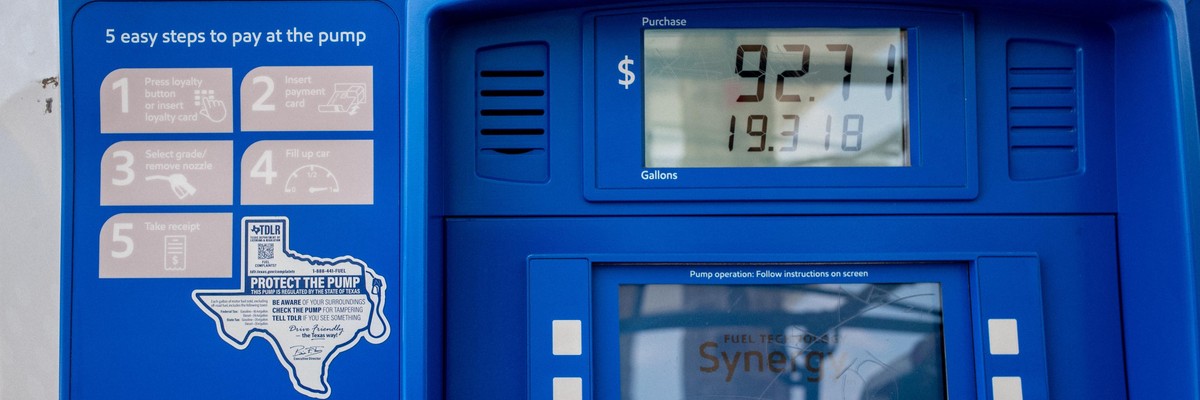Progressive demands for congressional action to curb corporate monopoly power were renewed Friday after federal data confirmed that certain heavily consolidated industries are continuing to rake in massive profits while working households struggle under the weight of high prices.
The latest figures from the Bureau for Economic Analysis show that the profits of the U.S. coal and oil industry increased 340% between the first and second quarters of 2022. Companies selling petroleum and coal products made an estimated $49.7 billion in profits from April to June, compared with $11.3 billion from January to March.
Meanwhile, executives in the nation's transportation and warehousing sector enjoyed a nearly 40% increase in profits during the same time period, pocketing $124.4 billion in the second quarter after taking home $89.4 billion over the first three months of the year.
"We've heard directly from executives in the sectors that families depend on--from oil, to auto shops, to airlines--that inflation has been good for business," Rakeen Mabud, chief economist and managing director of policy and research at the Groundwork Collaborative, said in a statement.
"The latest corporate profit data shows their price strategies are bearing fruit," she added.
Through its extensive research on corporate earnings calls, Groundwork has documented what executives have been saying about their sky-high profits. The progressive think tank compiled some key findings from its analyses of oil, motor vehicle, airline, and commercial real estate giants:
- Chevron made $11.6 billion in Q2, up from around $6 billion last quarter, and up from 247% a year ago. Their CEO touted it as one of the strongest in more than a decade, stating, "We delivered another strong quarter... the highest since 2008." Chevron emphasized it was "focused on generating returns" instead of production, as their production actually decreased despite banking monster profits. [7/29/22]
- Driven Brands, which runs auto shops and car repair services across the country, boasted that their essential services made it easier to take advantage of inflation: "We offer non-discretionary needs-based services. This means even as prices rise, consumers continue to get their vehicles repaired, maintained, washed and they're all changed, and it will be very low on the list of services that are downsized when spending is squeezed." [4/27/22]
- Four major U.S. airlines, Delta, United, American, and Southwest, each bragged about how they are constraining capacity on flights to drive up prices and pull in more profits. As Delta's CFO told analysts, the company's financial performance was ahead of expectations, with the "primary drivers are slower capacity restoration..." [7/13/22]
- Prologis, a global commercial real estate firm, has benefitted from the war in Ukraine, with their CEO saying, "Europe is as good as I remember Europe being... the neighboring countries have actually increased demand and led to actually better market dynamics for unfortunate and tragic reasons but it simply has." Prologis' CEO also boasted how the company is able to tell customers to "take a hike" if they ask for a discount because of market conditions, as they eventually come back and end up paying more. [7/18/22]
Although retailers started charging more for gasoline in 2021 as consumer demand, which plummeted during the early stages of the Covid-19 pandemic, began to outpace supply--deliberately suppressed at the behest of shareholders to boost profits--price gouging at the pump has intensified since Russia invaded Ukraine in late February.
While receiving an average of $2.8 billion dollars per day in public subsidies, the same fossil fuel corporations that are harming the planet have capitalized on war--jacking up prices and rewarding investors with massive stock buybacks.
An overwhelming 80% of U.S. voters--including 73% of Republicans--said they would support the Big Oil Windfall Profits Tax when congressional Democrats introduced the legislation in March.
Dozens of progressive advocacy groups and lawmakers have urged President Joe Biden, House Speaker Nancy Pelosi (D-Calif.), and Senate Majority Leader Chuck Schumer (D-N.Y.) to support the measure, which would redistribute an estimated $45 billion to U.S. households.
Despite Sen. Elizabeth Warren's (D-Mass.) argument earlier this year that the proposal can help Democrats win in the quickly approaching midterms, it hasn't gone anywhere in the existing Congress.
A new poll finds that the Democratic Party's "biggest gains" in voter support come when they "take on the corporate monopolies that are driving up prices, despite making super profits." Amid the ongoing cost-of-living crisis, the current majority party can highlight how the GOP minority's obstructionism is "doing big corporations' bidding on price-gouging and taxes."
The survey suggests that even if they don't have a sufficient number of votes at the moment, Democrats should publicly and aggressively push for the kinds of progressive economic policies they could enact if they win big enough House and Senate majorities in November's pivotal elections.
On Friday, Mabud stressed that "policymakers must address corporate profiteering as a driver of inflation by reining in megacorporations and addressing the unsustainably high prices facing families around the country."
This echoes the case the economist made during her congressional testimony last week, when she told House lawmakers that the Federal Reserve's interest rate hikes, which threaten to put hundreds of thousands of vulnerable workers out of a job, "will not address any of the underlying causes of our supply shortages and do nothing to address profiteering."
"Big corporations are getting away with pushing up prices to fatten their profit margins, and families are quite literally paying the price," Mabud added. "It's time to rein them in."



